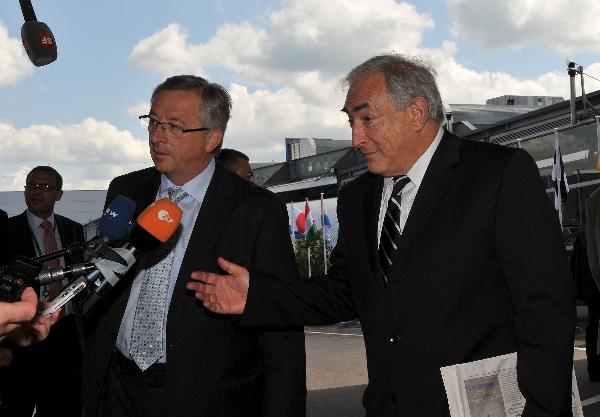EU finalizes rescue package
Finance ministers of eurozone countries agreed on Monday on final details of the 750-billion-euro (about 897 billion U.S. dollars) rescue package designed to contain a spreading debt crisis.
 |
|
President of Eurogroup and Luxembourg Prime Minister Jean-Claude Juncker (L) and Managing Director of International Monetary Fund (IMF) Dominique Strauss-Kahn take interviews before the Eurozone financial ministers' meeting starts in Luxembourg, June 7, 2010. Finance ministers of the 16-member Eurozone are meeting here on Monday to finalize details of the rescue package agreed about one month ago to assure markets rattled by the European debt crisis. [Wu Wei/Xinhua] |
"The facility has been just set up today in the form of a limited liability company in Luxembourg," Luxembourg Prime Minister Jean-Claude Juncker told reporters after chairing a eurozone finance ministers' meeting here Monday.
The European Financial Stability Facility, through a special purpose vehicle, will issue bonds to borrow up to 440 billion euros (526 billion U.S. dollars) from the financial markets with guarantees from eurozone countries and lend it to indebted members.
The facility is the largest bulk of the 750-billion-euro rescue package agreed by EU finance ministers on May 10.?Of the 750 billion euros, the European Commission will also raise 60 billion euros (72 billion U.S. dollars) and the International Monetary Fund will contribute about 250 billion euros (299 billion U.S. dollars).
Eurozone finance ministers agreed this time on how the facility should work. Juncker said he expected it would become operational as early as this month.
"The facility would be operational as soon as countries representing 90 percent of shareholding have completed their national procedures, which is expected in the course of June," he said.
Germany, which will provide the largest chunk of the rescue package, has already approved its contribution last month.
In the meantime, the 60 billion euros supplied by the European Commission would be available for countries in urgent need, Juncker said.
Olli Rehn, European Union (EU) Commissioner for Economic and Financial Affairs, said the support to countries facing severe difficulties should be provided with strict conditions, which would be the same as applied to Greece.
Eurozone countries agreed on a separate 110-billion-euro (132 billion U.S. dollars) rescue deal for Greece in early May. In return, Athens was ordered to take aggressive austerity measures to cut its budgetary deficits and public debts.
"The essence of the thing is that this is based on the same kind of conditionality as the rescue package for Greece, if this is needed. In other words, this is strictly conditional," Rehn said.
 0
0 






